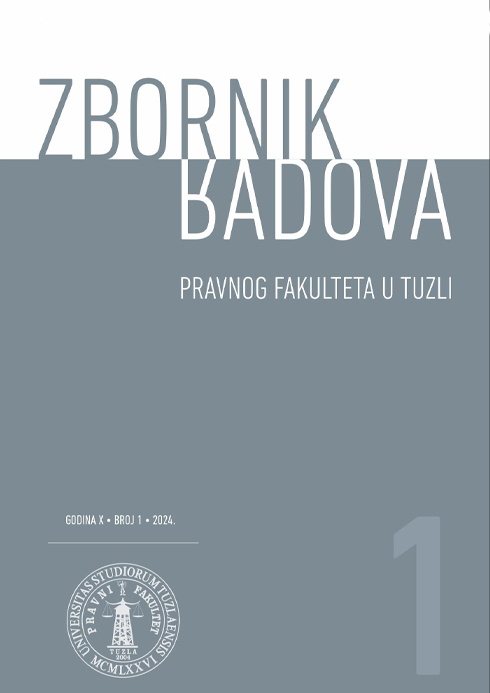KONCEPT ZLOČINA DRŽAVE – OZBILJNA POVREDA OBAVEZE KOJA PROIZILAZI IZ PEREMPTORNIH NORMI OPĆEG MEĐUNARODNOG PRAVA
THE CONCEPT OF A STATE CRIME (CRIME D’ÉTAT)
A SERIOUS BREACH OF AN OBLIGATION UNDER PEREMPTORY NORMS OF GENERAL INTERNATIONAL LAW
Author(s): Enis OmerovićSubject(s): Law, Constitution, Jurisprudence, International Law
Published by: Pravni fakultet Univerziteta u Tuzli
Keywords: State crime; international crime; internationally wrongful act; jus cogens; State responsibility;
Summary/Abstract: In the law on State responsibility, even the United Nations International Law Commission (ILC) could not avoid the problem of adequately defining State crimes. However, in the long-term work of the Commission on the Rules on the Responsibility of States for Internationally Wrongful Acts (ARSIWA), learning about the division of international obligations into so-called ordinary legal norms and mandatory ones, which will result in the connection of an international crime with the latter, thus crystallising a special regime of State responsibility for international crimes, which will continue to exist. Article 19 of the Draft Articles, which appeared in 1976, reflects the difference between international crimes and international delicts, which is mainly based on the understanding that an international delict represents a violation of the subjective right of a State, while an international crime causes a breach of the objective international legal order, i.e. international legal community. Significantly, the relevant provision does not contain the term “State crime”, and it also lacked the distinction of legal regimes of State responsibility for one or another group of internationally wrongful acts. Equally, there needed to be more development and elaboration of the concept of State responsibility for international crime regarding international consequences and procedures in executing these provisions in practice. In the research, we establish that there is no doubt that the presence of the term international crime in the Draft Articles from 1976 to 2001, when it was abandoned in the final text of the Articles, was related to the concept of State criminal responsibility. The introduction of the dichotomy between an international delict and an international crime in Law on State Responsibility should probably have led to the distinction between civil and criminal responsibility of the main subject of international law. However, dividing international illegal acts into delicts and crimes makes sense. It has practical significance only if it leads to different consequences, i.e. according to two different regimes or systems of legal responsibility of a State. In the paper, we question whether one of the leading legal arguments for the deletion of Article 19 from the final text of the 2001 Articles was the then-prevailing position that the responsibility of a State is not criminal, that against a State at the international level, for example, before the International Court of Justice in The Hague (ICJ), criminal proceedings is not conducted nor is it imposed criminal sanctions. In contemporary international legal order, criminal responsibility is reserved for an individual. Thus, the individualisation of criminal responsibility in international law co-occurred and decriminalized State responsibility. However, it seems that these discussions on the above issues did not go in the direction of transferring the system of national criminal law into international law on responsibility nor of observing the institutions of international law through the prism of domestic law. Still, we believe the emphasis was on creating stricter legal consequences for violations that constitute international crimes and emphasise that such abuses cannot be reduced to a bilateral relationship between the offending and injured States. Article 19 of the previous Draft Articles wanted to indicate that the international community also considers those illegal acts to be more severe than others since they affect the fundamental interests on which it rests. If Article 19 contained an unsustainable or clumsy provision, this did not mean giving up its essence - that a State can commit a serious violation of an international obligation deriving from an imperative norm of general international law (jus cogens), which offends the central values of the international community and where, conditionally stated, each State can raise the issue of formally determining the responsibility of a State that violates jus cogens, such as the fact that the West African state Republic of Gambia sued the Asian state of Myanmar before the ICJ in 2019 (Application of the Convention on the Prevention and Punishment of the Crime of Genocide (The Gambia v. Myanmar)). Therefore, in ARSIWA 2001, in Articles 40 and 41, serious violations of the peremptory norms of international law and the specific consequences of such violations of international law are discussed, which supports our thesis that today we discuss the international responsibility of States for all types of internationally wrongful acts, since international law has its legal sources, terms, concepts, principles, definitions, institutes, institutions, and its legalities.
Journal: Zbornik radova Pravnog fakulteta u Tuzli
- Issue Year: 10/2024
- Issue No: 1
- Page Range: 29-66
- Page Count: 38
- Language: Bosnian

